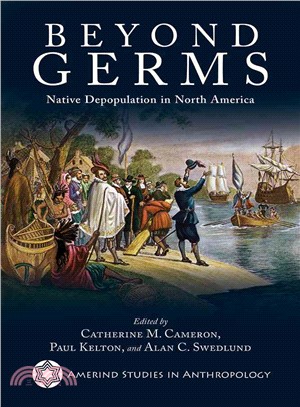Beyond Germs ─ Native Depopulation in North America
商品資訊
系列名:Amerind Studies in Archaeology
ISBN13:9780816535545
出版社:Univ of Arizona Pr
作者:Catherine M. Cameron (EDT); Paul Kelton (EDT); Alan C. Swedlund (EDT)
出版日:2016/08/15
裝訂/頁數:平裝/288頁
規格:22.9cm*15.2cm*1.9cm (高/寬/厚)
定價
:NT$ 1797 元無庫存,下單後進貨(到貨天數約30-45天)
下單可得紅利積點:53 點
商品簡介
作者簡介
相關商品
商品簡介
There is no question that European colonization introduced smallpox, measles, and other infectious diseases to the Americas, causing considerable harm and death to indigenous peoples. But though these diseases were devastating, their impact has been widely exaggerated. Warfare, enslavement, land expropriation, removals, erasure of identity, and other factors undermined Native populations. These factors worked in a deadly cabal with germs to cause epidemics, exacerbate mortality, and curtail population recovery.
Beyond Germs: Native Depopulation in North America challenges the “virgin soil” hypothesis that was used for decades to explain the decimation of the indigenous people of North America. This hypothesis argues that the massive depopulation of the New World was caused primarily by diseases brought by European colonists that infected Native populations lacking immunity to foreign pathogens. In Beyond Germs, contributors expertly argue that blaming germs lets Europeans off the hook for the enormous number of Native American deaths that occurred after 1492.
Archaeologists, anthropologists, and historians come together in this cutting-edge volume to report a wide variety of other factors in the decline in the indigenous population, including genocide, forced labor, and population dislocation. These factors led to what the editors describe in their introduction as “systemic structural violence” on the Native populations of North America.
While we may never know the full extent of Native depopulation during the colonial period because the evidence available for indigenous communities is notoriously slim and problematic, what is certain is that a generation of scholars has significantly overemphasized disease as the cause of depopulation and has downplayed the active role of Europeans in inciting wars, destroying livelihoods, and erasing identities.
Beyond Germs: Native Depopulation in North America challenges the “virgin soil” hypothesis that was used for decades to explain the decimation of the indigenous people of North America. This hypothesis argues that the massive depopulation of the New World was caused primarily by diseases brought by European colonists that infected Native populations lacking immunity to foreign pathogens. In Beyond Germs, contributors expertly argue that blaming germs lets Europeans off the hook for the enormous number of Native American deaths that occurred after 1492.
Archaeologists, anthropologists, and historians come together in this cutting-edge volume to report a wide variety of other factors in the decline in the indigenous population, including genocide, forced labor, and population dislocation. These factors led to what the editors describe in their introduction as “systemic structural violence” on the Native populations of North America.
While we may never know the full extent of Native depopulation during the colonial period because the evidence available for indigenous communities is notoriously slim and problematic, what is certain is that a generation of scholars has significantly overemphasized disease as the cause of depopulation and has downplayed the active role of Europeans in inciting wars, destroying livelihoods, and erasing identities.
作者簡介
Catherine M. Cameron is a professor of anthropology at the University of Colorado Boulder.?An archaeologist, she studies captives in prehistory and works in the American Southwest. She edited the book Invisible Citizens: Captives and Their Consequences.?
?
Paul Kelton is a professor of history and a member of the executive board of the Indigenous Studies Program at the University of Kansas. He is the author of Epidemics and Enslavement: Biological Catastrophe in the Native Southeast, 1492–1715 and Cherokee Medicine, Colonial Germs: An Indigenous Nation’s Fight against Smallpox, 1518–1824.
?
Alan C. Swedlund is a professor emeritus and former chair of the Anthropology Department at the University of Massachusetts, Amherst. He is the author of Shadows in the Valley: A Cultural History of Illness, Death, and Loss in New England, 1840–1916.
?
Paul Kelton is a professor of history and a member of the executive board of the Indigenous Studies Program at the University of Kansas. He is the author of Epidemics and Enslavement: Biological Catastrophe in the Native Southeast, 1492–1715 and Cherokee Medicine, Colonial Germs: An Indigenous Nation’s Fight against Smallpox, 1518–1824.
?
Alan C. Swedlund is a professor emeritus and former chair of the Anthropology Department at the University of Massachusetts, Amherst. He is the author of Shadows in the Valley: A Cultural History of Illness, Death, and Loss in New England, 1840–1916.
主題書展
更多
主題書展
更多書展今日66折
您曾經瀏覽過的商品
購物須知
外文書商品之書封,為出版社提供之樣本。實際出貨商品,以出版社所提供之現有版本為主。部份書籍,因出版社供應狀況特殊,匯率將依實際狀況做調整。
無庫存之商品,在您完成訂單程序之後,將以空運的方式為你下單調貨。為了縮短等待的時間,建議您將外文書與其他商品分開下單,以獲得最快的取貨速度,平均調貨時間為1~2個月。
為了保護您的權益,「三民網路書店」提供會員七日商品鑑賞期(收到商品為起始日)。
若要辦理退貨,請在商品鑑賞期內寄回,且商品必須是全新狀態與完整包裝(商品、附件、發票、隨貨贈品等)否則恕不接受退貨。
























